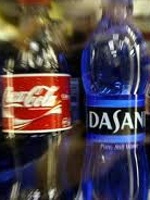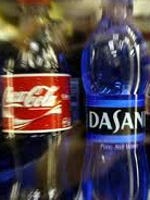Documents link Coke to Grand Canyon plastic bottle reversal
March 11, 2015

[ Targeted News Service ]
Public Employees for Environmental Responsibility issued claim that a major beverage bottler used corporate gifts and ties to national park fundraisers to influence the National Park Service (NPS) Director, according to documents obtained by Public Employees for Environmental Responsibility (PEER). The gift prompted the Director to issue an order stopping Grand Canyon National Park from going forward with a long-planned ban on sale of individual plastic water bottles just days before it went into effect. This June NPS Director Jon Jarvis went further, directing, without public announcement, that no park may eliminate plastic water bottle sales in order to preserve "consumer choice" - the rallying cry used by commercial bottlers.

Grand Canyon
When asked about PEER charges that the National Park Foundation relayed concerns by the Coca Cola Company, a major sponsor of the Foundation (the official fundraising arm of NPS), about the impending January 1, 2011 Grand Canyon plastic bottle ban at, Jarvis issued a blanket denial, saying: "My decision to hold off the ban was not influenced by Coke, but rather the service-wide implications to our concessions contracts, and frankly the concern for public safety in a desert park."
Documents obtained by PEER after filing of a Freedom of Information Act lawsuit tell a different story:
Lobbying by National Park Foundation President Neil Mulholland on behalf of Coca Cola, a major bottled water maker, led directly to Jarvis' decision with Jarvis himself writing "While I applaud the intent, there are going to be consequences, since Coke is a major sponsor of our recycling efforts";
This summer, according to an email from his lead staff person, "the Director's view is NOT ban sale of bottled water, but to go the choice route" (emphasis in original). Records indicate another dozen parks, including Yellowstone and Death Valley, had been considering bottle bans; and
Internal park memos touted the clear environmental and economic benefits of phasing out plastic water bottles. Even an internal study by Nestle, another major bottler, conceded tap water is the preferred alternative to bottled on a lifecycle basis.
Significantly the documents did not show that public safety was a consideration at all. It was not even a discussion item at a January 2011 summit with bottlers, concessionaires and park managers. In fact the only item added to the draft agenda was to expand discussion of bottler activities. Following that meeting, NPS research assignments revolved principally around economic issues; again, safety was not a factor.
"These documents confirm what appeared obvious - corporate donations influenced national park conservation policies," claims PEER Executive Director Jeff Ruch.
Jarvis' expressed concern about "public safety in a desert park" appears especially farfetched given that Grand Canyon had spent more than $300,000 installing "watering stations" and made reusable containers available. Zion National Park, a desert park, banned plastic bottles more than two years ago with no reported ill effects. Not even Coca Cola contends its products are needed for public safety.
About the Author(s)
You May Also Like


